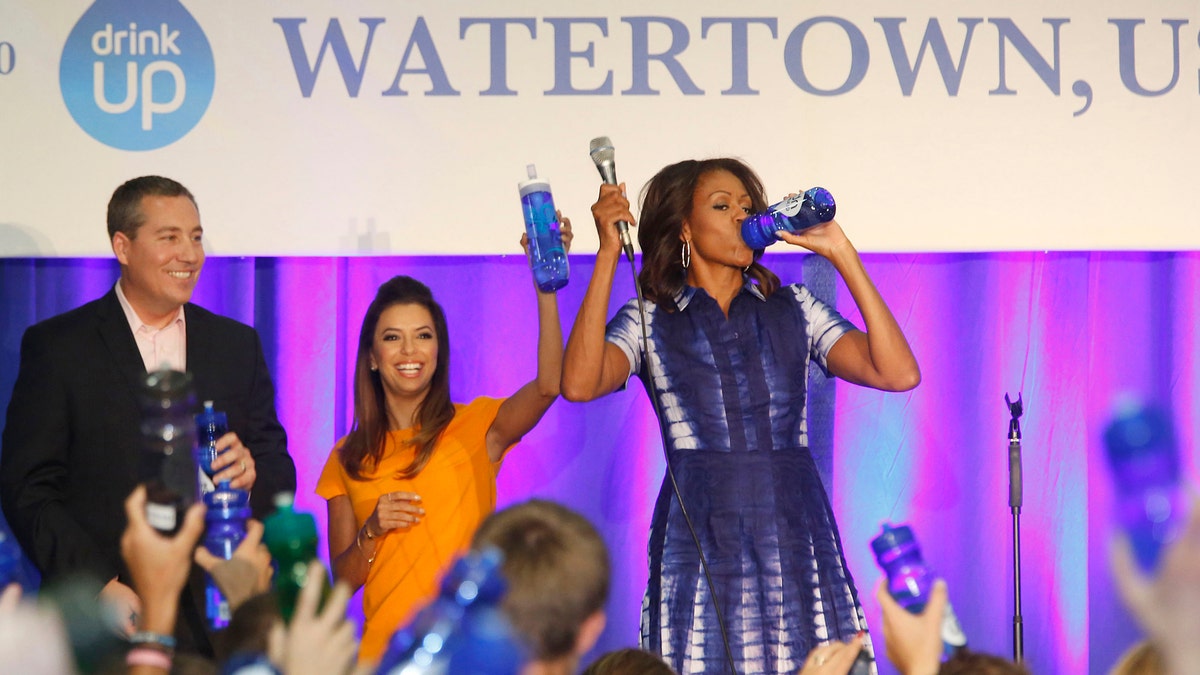
Actress Eva Longoria teams with Brita to join First Lady Michelle Obama and Watertown High School principal Scott Mantei in support of "Drink Up," a new effort launched by the Partnership for a Healthier America in Watertown, Wis. (Jonathan Kirn/Feature Photo Service for Brita)
First lady Michelle Obama led Wisconsin high school students in a toast to "the best drink in town" Thursday as she launched a campaign to encourage people to drink more water - something she said was the single best thing Americans could do to improve their health.
"Water is so basic, and because it is so plentiful, sometimes we just forget about it amid all the ads we watch on television and all the messages we receive every day about what to eat and drink," Mrs. Obama said. "The truth is, water just gets drowned out."
The first lady launched the campaign for the nonprofit Partnership for a Healthier America in Watertown in part because the city has been recognized for the quality of its water.
While the new campaign is widely viewed as encouraging people to drink water rather than sugary sodas, partnership president and CEO Larry Soler said it is not about pushing a particular type of water or stressing it over other beverages.
Mrs. Obama has counseled people in the past to switch from soda to water and has talked about seeing improvement in her two daughters' health after making that change in their diets. She spoke Thursday about seeing her daughters become more alert after they began drinking more water, but she did not mention any switch from soda.
The first lady long ago backed away from criticism of soda because her anti-childhood obesity initiative, "Let's Move," is premised on the idea that change won't happen without buy-in from the food industry, New York University food scientist Marion Nestle said.
The latest campaign is backed by the American Beverage Association, which represents the makers of soft drinks, sports drinks, energy drinks and juices as well as bottled water, and the International Bottled Water Association.
Nestle said it actually helps the major soft drink companies, which have seen a decrease in soda sales and are investing heavily in promoting bottled water brands and other drinks, she said.
"This is a partnership with soda companies to promote their bottled waters," Nestle said.
Environmental advocates say they're disappointed the campaign ignores concerns about plastic bottles ending up in waterways and reductions in federal funding for public water systems.
"We applaud the first lady's initiative to encourage people to choose water over sugary beverages, but we do have concerns that this partnership is working in conjunction with the bottled water industry and wish that instead she were encouraging people to choose the much more affordable, more regulated option of tap water," said Emily Wurth, water program director for Food and Water Watch.
Wurth cited a federal report that found only one-fourth of plastic water bottles are recycled. She also noted that bottled water often comes from public water systems.
While Mrs. Obama did not promote tap water over bottled water, many public utility workers in Wisconsin saw her visit as an endorsement of their work. Mrs. Obama noted Watertown had been recognized as having the best-tasting water in the state - an award it received in 2010 from the Wisconsin Water Association, which represents public utilities.
"You know what you're getting with tap water because it's a regulated thing," water association vice chair Ann-Perry Witmer said. "It really is the best tasting and the healthiest for you."
Watertown, about midway between Milwaukee and Madison, is home to Wis-Pak Inc., which manufactures and distributes Pepsi-Cola products - including Aquafina. It's also home to 7-Up Bottling Co., a family-owned business that distributes bottled water and other beverages.
Soler said after the first lady's speech the campaign would be most successful by not advocating one water source over another, noting the choice of what type of water to drink lies with individuals. Mrs. Obama drank from a reusable water bottle at the launch, and the campaign includes a push for more public drinking stations.
Sam Kass, executive director of "Let's Move," has cited federal statistics showing about 40 percent of Americans drink less than half the typically recommended eight cups of water a day.
Nestle said the message that Americans don't drink enough water is questionable.
"I'm not aware of any nutrition science that backs that up ... there's so much water in food and in what people are eating that unless you're an elite athlete, at very high altitude or old where your thirst mechanism doesn't work very well, it's just simply a non-issue in my view," Nestle said.
